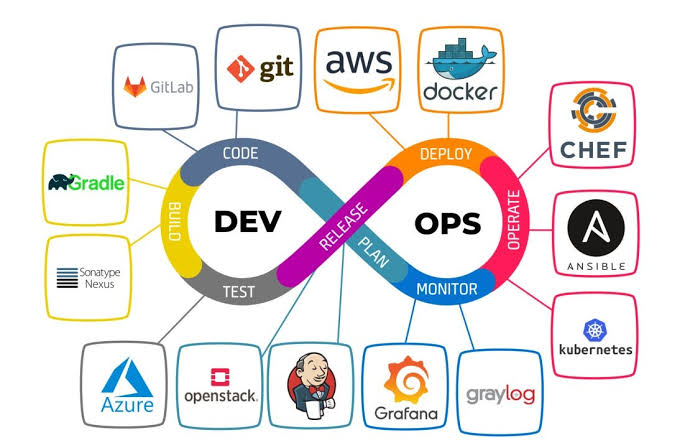The DevOps tools for software developers
In fast-paced world of software development. DevOps has emerged as critical methodology for enhancing collaboration. Automating processes. And ensuring continuous delivery of high-quality software. DevOps tools play crucial role in streamlining software development lifecycle. From code integration to deployment. And monitoring. This article explores top 10 DevOps tools that developers should consider. To boost their productivity and efficiency.
1. Jenkins
Jenkins is one of most popular open-source automation servers used in DevOps. It facilitates continuous integration (CI). Also continuous delivery (CD) allowing developers to automate building. Testing and deployment of applications. Jenkins supports a vast array of plugins, making it highly customizable. Fit various project needs. Its robust community support and extensive documentation make it ideal choice for both beginners and seasoned developers.
2. Docker
Docker revolutionized the way applications developed shipped. And deployed by introducing containerization. Containers encapsulate application and its dependencies. Ensuring consistent environments across development, testing and production. Docker simplifies process of creating managing and deploying containers. Enabling developers to build applications that are portable and scalable. Its compatibility with various orchestration tools like Kubernetes enhances its utility in complex, multi-container deployments.
3. Kubernetes
Kubernetes, often referred to as K8s, is a powerful container orchestration platform developed by Google. It automates the deployment, scaling, and management of containerized applications, ensuring high availability and fault tolerance. Kubernetes handles the complexities of container orchestration, such as load balancing, self-healing, and automated rollouts and rollbacks. Its ability to manage clusters of containers efficiently makes it a cornerstone tool for large-scale DevOps operations.
4. Git
Git is a distributed version control system that has become an essential tool for developers. It allows teams to track changes in their codebase, collaborate effectively, and manage different versions of their projects. Platforms like GitHub, GitLab, and Bitbucket provide additional functionalities such as code review, issue tracking, and continuous integration pipelines. Git’s flexibility and powerful branching model make it a fundamental tool for any DevOps toolkit.
5. Ansible
Ansible is an open-source automation tool used for configuration management, application deployment, and task automation. It uses a simple, human-readable language called YAML to describe automation jobs, making it accessible to both developers and system administrators. Ansible’s agentless architecture eliminates the need for installing additional software on target nodes, simplifying the management of diverse IT environments. Its modular design and extensive library of pre-built modules streamline the automation of complex tasks.
6. Terraform
Terraform, developed by HashiCorp, is an infrastructure as code (IaC) tool that allows developers to define and provision cloud infrastructure using declarative configuration files. It supports a wide range of cloud providers, including AWS, Azure, and Google Cloud, enabling seamless multi-cloud deployments. Terraform’s ability to manage infrastructure lifecycle, from creation to destruction, ensures consistent and repeatable infrastructure setups. Its state management and plan/apply workflow provide clear visibility into infrastructure changes, reducing the risk of configuration drift.
7. Prometheus
Prometheus is an open-source monitoring and alerting toolkit designed for reliability and scalability. Originally developed by SoundCloud, it has become a core component of many DevOps monitoring stacks. Prometheus collects metrics from various services and stores them in a time-series database, enabling real-time monitoring and alerting. Its powerful query language, PromQL, allows developers to analyze metrics and gain insights into application performance. Integration with visualization tools like Grafana enhances its capabilities, providing comprehensive monitoring solutions.
8. Nagios
Nagios is a widely-used open-source monitoring tool that helps developers and IT teams keep track of their systems, applications, and network infrastructure. It provides comprehensive monitoring and alerting capabilities, allowing teams to detect and address issues before they impact end-users. Nagios supports a wide range of plugins and integrations, enabling extensive customization to meet specific monitoring needs. Its ability to monitor various metrics, from server health to application performance, makes it a versatile tool for ensuring system reliability.
9. Puppet
Puppet is a configuration management tool that automates the provisioning and management of infrastructure. It uses a declarative language to define desired system states, ensuring that all nodes in a network remain consistently configured. Puppet’s agent-master architecture allows for centralized control and reporting, making it easy to manage large-scale environments. Its extensive library of pre-built modules and integrations with various cloud providers streamline the deployment and management of infrastructure.
10. Splunk
Splunk is a powerful data analytics and monitoring platform used for searching, monitoring, and analyzing machine-generated data. It provides real-time insights into system performance, security events, and application logs, enabling proactive issue resolution and security incident detection. Splunk’s ability to ingest and analyze large volumes of data from diverse sources makes it an invaluable tool for DevOps teams seeking to optimize their operations and improve system reliability. Its advanced search capabilities and customizable dashboards provide deep visibility into IT environments.
